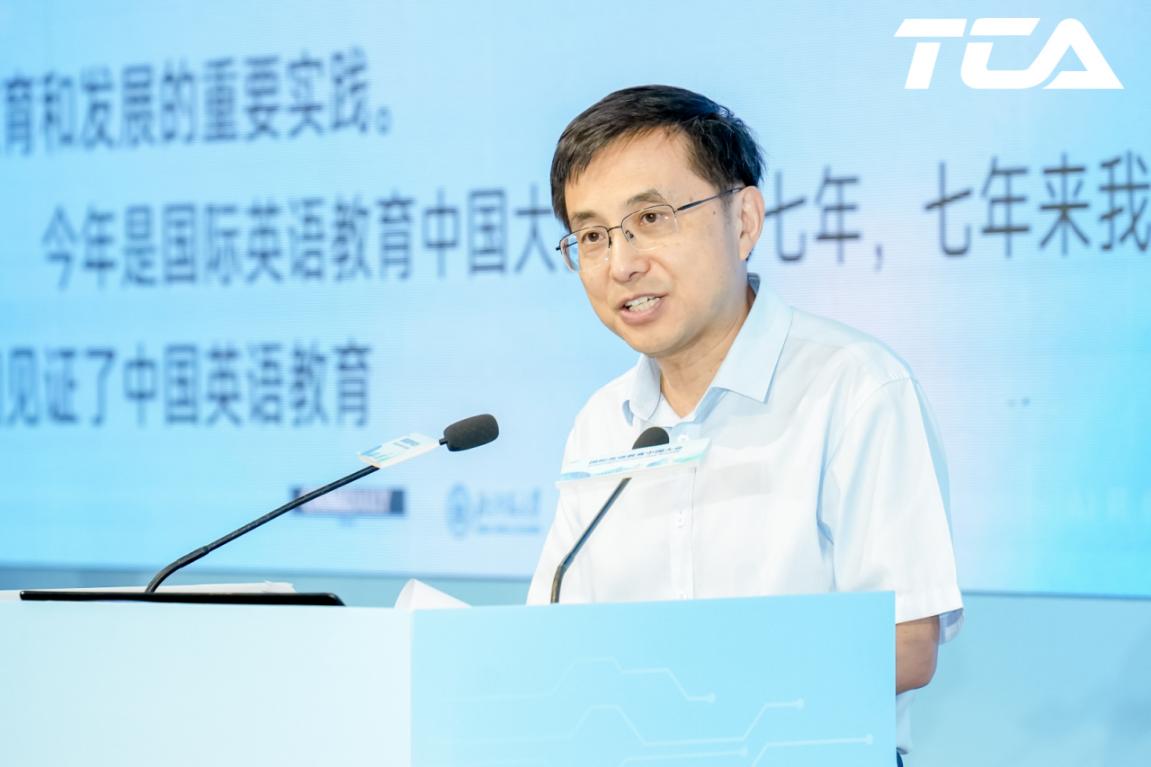
Zhou Li, deputy director of the Ministry of Education's Department of International Cooperation and Exchanges, delivers a speech at the opening ceremony of the 2024 Global English Education China Assembly in Zhuhai, Guangdong province on Friday. [Photo provided to chinadaily.com.cn]
Global English education faces both unprecedented opportunities and challenges in the rapidly evolving era of artificial intelligence, experts said during the 2024 Global English Education China Assembly that opened on Friday in Zhuhai, Guangdong province.
Organized by China Daily, Beijing Normal University and Shanghai International Studies University, the Global English Education China Assembly aims to promote scholarship and cross-cultural understanding among English educators in China and elsewhere.
An annual event since 2018, this year's assembly from Friday to Sunday has the theme of Transforming English Language Teaching in the AI Era, and brings together participants from around the world to share ideas and tools for improving English language teaching, according to the organizers.
Zhou Li, deputy director of the Ministry of Education's Department of International Cooperation and Exchanges, said knowledge innovation is advancing rapidly, bringing new opportunities and challenges to education.
Chinese foreign language education is expected to adapt to the educational transformation in the digital age, helping the country better integrate into the world while enabling the world to better understand China, she said.

Wang Hao, deputy editor-in-chief of China Daily, delivers a speech at the opening ceremony of the 2024 Global English Education China Assembly in Zhuhai, Guangdong province on Friday. [Photo provided to chinadaily.com.cn]
In a speech at the opening ceremony, Wang Hao, deputy editor-in-chief of China Daily, said: "Through cultural exchanges and mutual learning, the assembly will focus on promoting the high-quality development of global English education in the AI era."
Zhang Jing, vice-president of Shanghai International Studies University, said that generative AI is profoundly influencing English education amid the new wave of the technological revolution.
"We need to further consider how to empower foreign language disciplines with AI technology and improve the academic system," Zhang said.
Liu Jun, rector of the City University of Macao, said the application of artificial intelligence in English education has opened up new paths for personalized learning, innovative teaching methods and language proficiency enhancement.
Scholars at home and abroad will make efforts to create a more inclusive and efficient English learning environment for students worldwide, he said.

Aleksandra Popovski Golubovikj, the president of International Association of Teachers of English as a Foreign Language (IATEFL),delivers a speech at the opening ceremony of the 2024 Global English Education China Assembly in Zhuhai, Guangdong province on Friday. [Photo provided to chinadaily.com.cn]
Rose Luckin, an expert on AI in education and emeritus professor at University College London, said through an online video link that artificial intelligence can be leveraged to promote high-quality and accessible English language learning worldwide.
AI-powered tools and platforms have great potential to personalize learning, provide real-time feedback and bridge gaps, Luckin said.
"Generative AI can be used as a tool in education to tackle the big educational challenges," Luckin said, adding that this includes automated marking and feedback, intelligent tutoring systems and adaptive testing.
Luckin addressed the importance of developing ethical frameworks and policies to ensure that AI technologies are deployed responsibly and inclusively in global English education.
She highlighted the need for educators to acquire new skills and adapt their pedagogical approaches to effectively integrate AI into their teaching practices.
Zhang Xinsheng, a professor at Richmond American University London in the United Kingdom, talked about university foreign language learning and teaching in the AI era and the role of university education.
There is a trend worldwide that university language programs are decreasing along with the rise of technologies, especially AI-powered platforms, which make personalized learning and teaching possible and popular, he said.
"Language teachers should also be lifelong learners, with empathy and understanding of what language learning and teaching is about in the age of globalization and AI today," he said.
Ge Bingfang, an ELT supervisor from the Zhejiang Provincial Department of Education, focused on the voices and experiences from EFL classrooms in high schools.
Teachers apply AI in diverse ways, including essay grading and text analysis, to enhance teaching efficiency and student engagement, Ge said.
While using AI in teaching can improve the efficiency of lesson preparation and classroom interaction, it also raises concerns regarding originality and copyrights, he said.